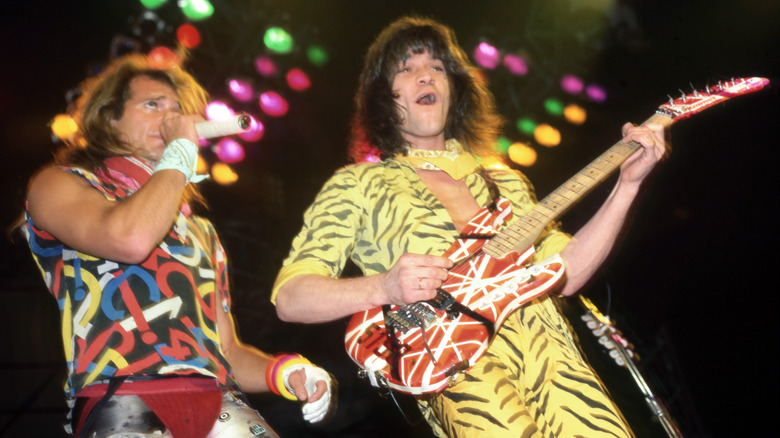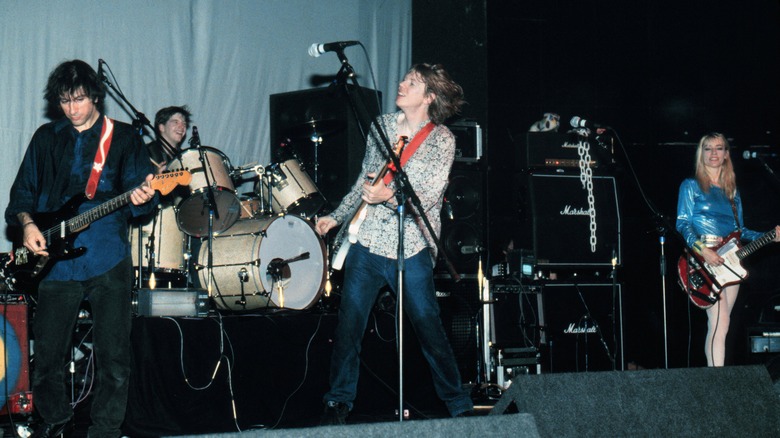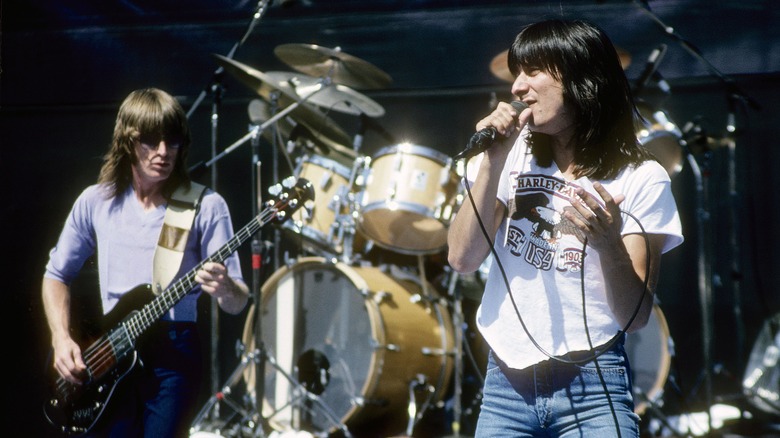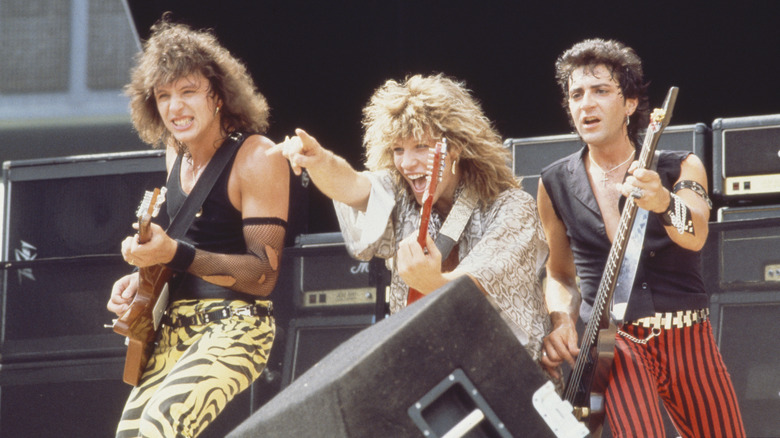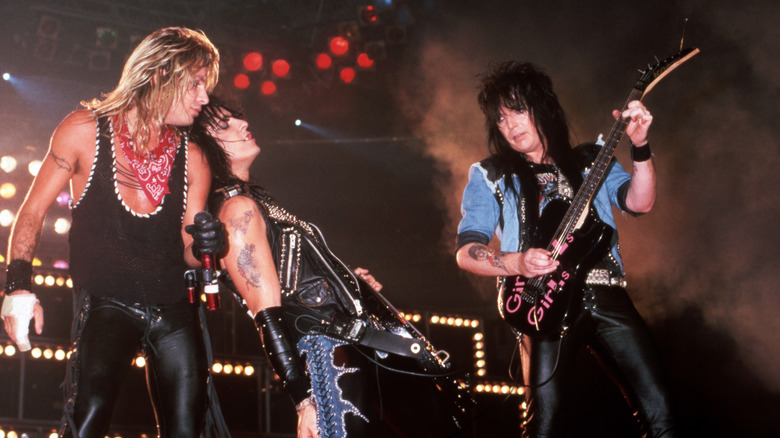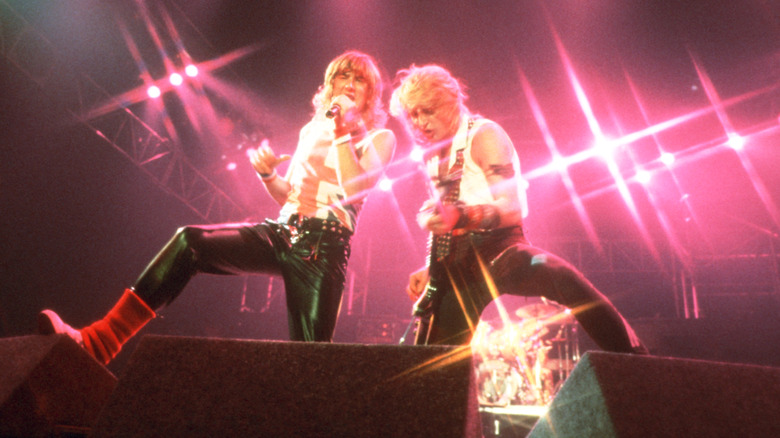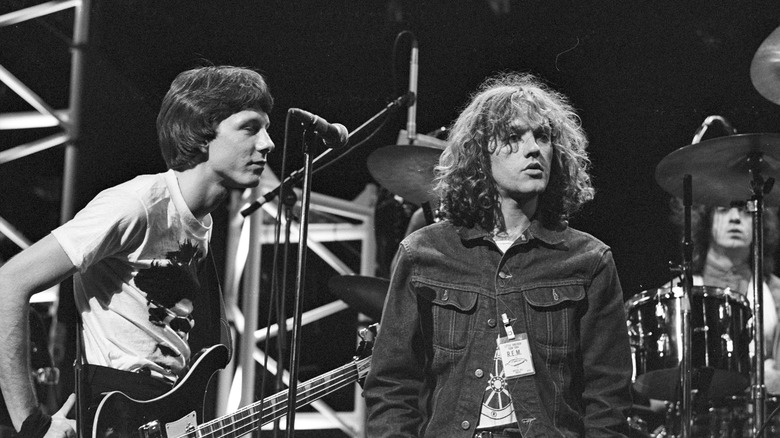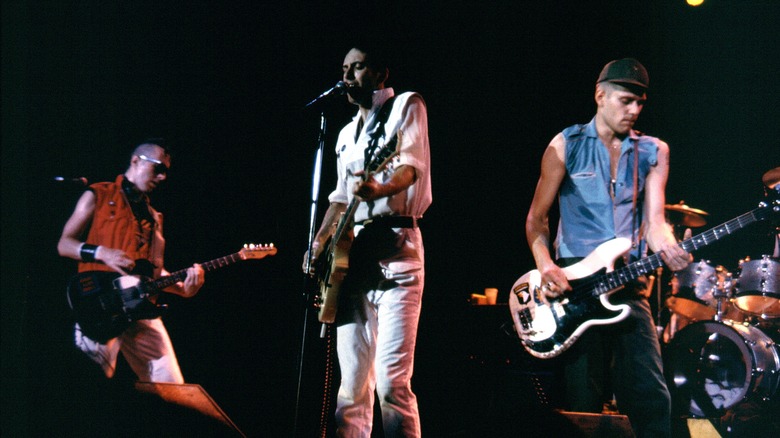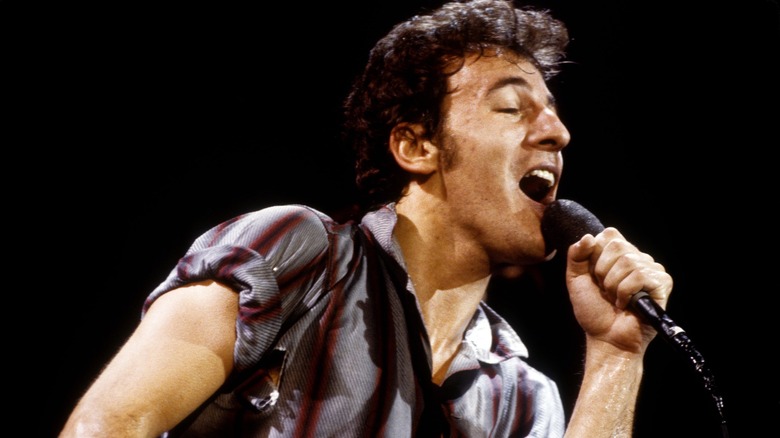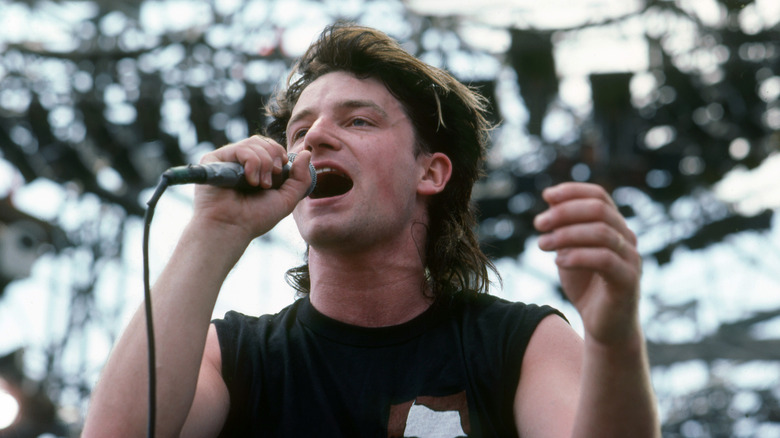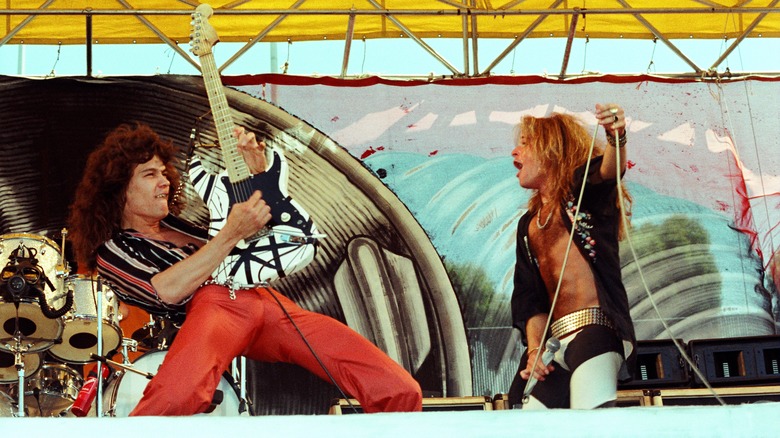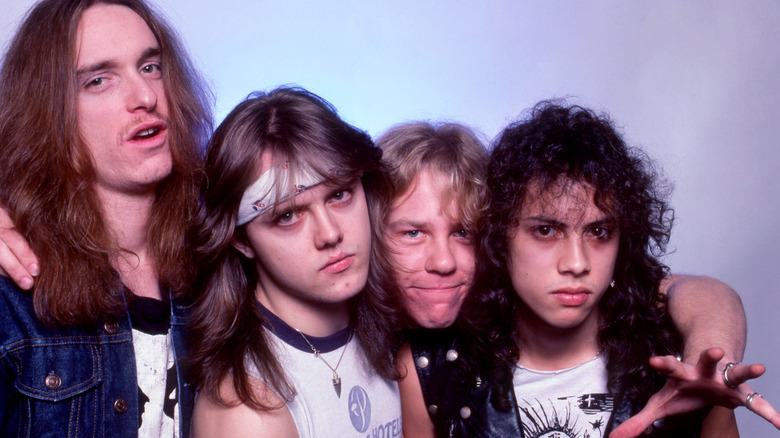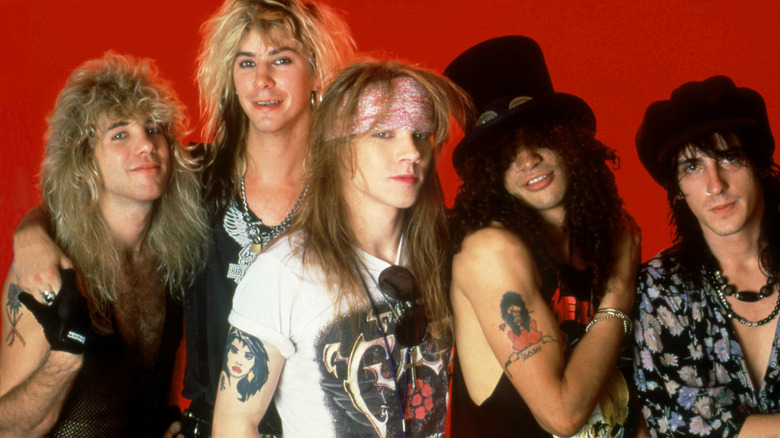The Most Important Rock Bands Of The '80s
We may receive a commission on purchases made from links.
You might think rock music's heyday was over by the '80s. There was plenty of commercial success still to be found, for sure, and Nirvana hadn't hit the scene yet. But The Beatles and Led Zeppelin were old news, and the stuff from this decade was over-processed, corporate cheese.
But not so fast. The decade was actually filled to bursting with boundary-pushing rock 'n' roll innovation. While plenty of bands obviously owed their very existence — and certainly their success — to the giants that preceded them, or to ongoing trends (like the MTV craze), there were a lot of other artists charting their own course. So many great rock artists graced the '80s, in fact, that several worthy contenders — including Depeche Mode, Dire Straits, Iron Maiden, The Cure, Poison, Skid Row, and Genesis — simply couldn't fit on this list. (Also, sorry Rush fans — that group formed a bit too early to qualify for this list. But they're not forgotten!)
But the bands that did make the cut are the best of the best. From U2 to Springsteen to Guns N' Roses, these are the most important rock bands of the '80s.
Sonic Youth
You generally think "'90s" when you think of Indie music. And while that genre certainly exploded in that decade thanks to Oasis, Blur, and a whole slew of other, lesser known artists (this list by NME is a great starting point if you want to dive in), the roots of the genre's massive success then can arguably be traced to the prior decade.
Sonic Youth, one of the pioneers of the format, formed all the way back in 1981. Decades later, they remain a criminally underappreciated act. In fact, there's a good chance you're more familiar with the member's work outside the group. Phoenix New Times has the receipts on everything from poetry books, record label management, and appearances on "Gilmore Girls." Besides, what quirky mid-2000s indie dramedy (looking at you, "Juno") hasn't featured at least one Sonic Youth song? But the group's influence is powerful and important. Formed in the "No Wave" post-punk movement, as per Britannica, the avant-grade group didn't even sign with a major label until 1990, two years after their masterpiece, "Dream Nation." What's more Underground and Indie than that?
Kim Gordon and Thurston Moore's marriage ended in 2011, taking the band with it. But everyone is more than thankful for the game-changing music they made throughout their nearly three-decade-long career. Besides, their legacy lives on in the form of every indie rock outfit that still stands on their shoulders.
Journey
Stadium rock crooners Journey are almost synonymous with their most famous single, and one of the most instantly recognizable songs of all time: "Don't Stop Believing." There's no denying the song is an all-time classic.
But as their profile on the Rock and Roll Hall Of Fame site explains, the power ballad masters have more to offer than that one tune. There's "Open Arms," for one, plus "Stone In Love," "Wheel In The Sky," "Faithfully," and plenty of other guilty pleasure classics that demand to be belted at the top of your lungs while flying down the highway with the windows down (via AllMusic).
And don't let their pop chart sensibilities fool you either: these guys were serious musicians. Classic-era frontman Steve Perry's talents have been well documented, Rolling Stone listed him as one of the best singers of all time, and that aforementioned Rock Hall article notes he's had a huge impact on modern artists like Kelly Clarkson, current Queen frontman Adam Lambert, and Arcade Fire. But other band members are no chumps. Next time you hear a Journey song, try to listen to the stellar musicianship behind those anthemic, sing-along choruses. Don't worry about missing out on those, by the way: you'll have plenty of time to enjoy them, since they'll be stuck on a loop in your head for days after even a brief listen.
Bon Jovi
While they were never the most revolutionary trend setters, New Jersey stadium rockers Bon Jovi arguably perfected '80s style arena rock more than any of their contemporaries. Just look at "Slippery When Wet," their monster third studio release from 1986. Do any songs scream "'80s" more than "You Give Love A Bad Name," or "Livin' On A Prayer" (sorry for getting that one stuck in your head by merely mentioning it)? They followed that up with 1988's "New Jersey," spearheaded by hit singles "Bad Medicine" and "Lay Your Hands On Me," which U Discover Music says proved they weren't just a flash in the pan.
But hair metal certainly was. By the early '90s, the big haired heap atop which Bon Jovi sat was old news. '80s glam bands had two choices: adapt, or die. They weren't the only ones that chose the former option, but the magnitude of their success here speaks volumes about their talent. According to another U Discover Music article, 1992's "Keep The Faith" was a radical departure from their iconic sound that was nothing like Grunge, which was all the rage at the time. Nevertheless, audiences lapped up the title track and "Bed of Roses." By the turn of the millennium, the music world had again become unrecognizable. But Bon Jovi adapted again with one of their biggest ever hits (per Billboard), "It's My Life." Their ability to stay relevant without weaponizing nostalgia is a testament to their enormous talent.
Mötley Crüe
Van Halen's virtuosic musicianship and party rock performances, along with Def Leppard's infectious, earworm hooks, helped bridge the gap between glam rock and heavy metal, and thus played huge roles in the formation of what would become pejoratively described as hair metal. But Mötley Crüe is arguably the first and most influential band that actually fits within that genre, as opposed to being a stylistically adjacent but external influence upon it. After all, Liveabout says most other '80s hair metal acts swam in their wake.
But as Durango Herald points out, Môtley Crüe is more famous for being Môtley Crüe than they are for writing Mötley Crüe songs. In other words, tales of their hotel-trashing debauchery, drug addictions, deadly car crashes, and literally being resurrected from a fatal overdose (Far Out Magazine says founding bassist and songwriter Nikki Sixx was revived after a heroin overdose in 1987) have collectively eclipsed their actual music. After all, who read or watched "The Dirt" to see how "Home Sweet Home" was written?
Still, it's unfair to ignore their music. They don't have anything profound to say, and they're certainly not The Beatles when it comes to penning infectious melodies. But at the end of the day, "Girls, Girls, Girls," "Shout at the Devil," and "Kickstart My Heart" (via AllMusic) are perfectly serviceable glam metal anthems when you and your 52-year-old buddies are plastered on cheap beer at a Friday night Crüe concert.
If you or anyone you know is struggling with addiction issues, help is available. Visit the Substance Abuse and Mental Health Services Administration website or contact SAMHSA's National Helpline at 1-800-662-HELP (4357).
Def Leppard
British rockers Def Leppard got their start in the '70s as part of the New Wave of British Heavy Metal, alongside Iron Maiden and Motorhead. But U Discover Music claims they quickly outran their darker roots with infectious, hook-filled grooves engineered for pop radio instead of graffiti-smeared clubs. 1980's "On Through The Night" was a fine debut, showcasing songwriting talents that would only grow as they did. But it was 1983's "Pyromania" that blew the doors off for the band. Sugary earworms like "Photograph" and "Rock Of Ages" dominated the charts for over a year, alongside cuts off Michael Jackson's "Thriller." Suddenly, everyone in the world of rock was scrambling to write riffs and choruses as delicious as these. Some acts came closer than others, but they were all eating Leppard's dust at the end of the day.
Four years later, the band hit back even harder with their third album, 1987's hit-packed blockbuster "Hysteria." Once again, the charts were filled with peerless stadium rock anthems that'll get stuck on a loop in your head just by looking at the titles: "Pour Some Sugar On Me," "Armageddon It," and "Love Bites," are just three of the astonishing seven hit singles the album churned out.
These boys are undeniably a product of a bygone era they helped define. But those two records constitute one of the most enviable one-two punches in rock history, and are more than enough of a foundation on which to build a decades-spanning, world-touring career.
R.E.M.
Working for The Atlantic, Eric Harvey acknowledges that R.E.M.'s legacy has suffered for the last few decades: a predictable result of an old rock institution overstaying its welcome with a string of mediocre albums that are increasingly out of touch with a musical world that was leaving them behind.
But he also acknowledges that it hardly matters. When it comes time to write the history books, R.E.M. will be remembered as one of America's greatest and most important rock bands, based on the strength of the first decade and a half of musical and performative excellence. "Try naming another rock group without a traditional sex symbol on its roster that released only very-good albums for its first 16 years of existence," he writes, "albums that were willfully arty and seemingly uncommercial and yet continually built the band's following."
He makes a compelling point. Throughout the '80s and well into the '90s, R.E.M. released hit record after hit record after hit record. As the article points out, no one else — not Creedence Clearwater Revival, not the Beach Boys, not the Grateful Dead — can boast such a strong string of classics. It would take a lousy streak far worse than the group's comparably mediocre output in recent years to diminish that legacy.
The Clash
The Ramones and The Sex Pistols might've invented punk rock in the '70s, but they were old news by the next decade. One thing they barely had time to do was give the genre a political edge. But while The Sex Pistols just lobbed sonic grenades at the very concept of a political establishment, Culturs Magazine says The Clash took the time to dig deeper into social issues of the day and use their platform to speak real truth to power.
While most artists sang about love and heartbreak, the Clash were trying to get Iranian youths to defy the Shah and crank up the rock music, or using punk anthems to cry out for justice on behalf of African and Jamaican immigrants and the working class, or decrying police brutality and Western war hawk culture. Of course, celebrities have been doing this forever, and it often comes off as preachy and self-righteous. But Joe Strummer and the boys in The Clash somehow did it right on landmark records like "London Calling," one of the genre's — and the decade's — greatest albums.
Maybe it all makes perfect sense. At the end of the day, the article argues that what the Clash was really doing was trying to get their young audience to question the man. Not just because that's what rockers are supposed to do, but because the dignity of all mankind depends upon it. What's more punk rock, or rock 'n' roll, than that?
Bruce Springsteen
Some artists use outlandish costumes and personas or elaborate stage theatrics to make their shows an exercise in escapist fantasy. That's all well and good if it works. But Bruce Springsteen never bothered. The Boss has never pretended to be anything other than a denim-clad, guitar -linging Jersey boy who always meets audiences exactly where they are: at a weeknight concert with a plastic cup of cheap beer and a few buddies to sing along with until your voice gives out. The earnest simplicity of his act is exactly why it's so enduringly popular.
For Rolling Stone, who listed Bruce as one of the greatest musical artists of all time, Jackson's Browne writes, "In many ways, Bruce Springsteen is the embodiment of rock & roll. Combining strains of Appalachian music, rockabilly, blues and R&B, his work epitomizes rock's deepest values: desire, the need for freedom and the search to find yourself."
Stephen Metcalf concurs over at Slate, describing Springsteen as an icon of pure, mass appeal, rough-around-the-edges Americana (even if some or most of it is an act). It's the kind of magical, stripped-down, heartland, twangy authenticity that needs no lasers, dry ice, pyrotechnics, or trend-chasing to fill stadiums and souls, even decades after his "Born in The USA" heyday.
U2
Alexandra Kirkpatrick comes out swinging in this article from The Observer, claiming that U2 have influenced more bands than any other group in history. The Beatles might have something to say about that. But she's not wrong that the Irish rockers, radio and world tour staples the planet over since the mid '80s, have had a mighty impact on the world of music.
The article details how the band, fronted by Bono and guitarist The Edge, took blues and country and fused it with their own atmospheric light rock sensibilities to craft a stadium-filling sound that still sounds strikingly modern decades later. It's the sound that made 1987's "The Joshua Tree" — packed with hits like "Where The Streets Have No Name," "With Or Without You," and "I Still Haven't Found What I'm Looking For" — one of the decade's most essential front-to-back listens. 1991's "Achtung Baby," voted the most influential rock record of the last 25 years, according to Spin, proved the style had serious legs and would stand the test or time far better than other sounds U2 came up alongside in the '80s.
Maybe this band is a little before your time. But just check out the list of modern groups that wouldn't exist without them, as compiled by NME: Coldplay. Snow Patrol. Take That. Oasis. The list could go on. Point is, the entire sound of adult contemporary soft rock owes it all to these guys.
Van Halen
They technically got their start in the '70s, with a self-titled debut record that Loudersound says helped save hard rock in a rough era. But the full weight of Van Halen's impact wouldn't be felt until the next decade. By that point, frontman David Lee Roth's outrageous, hilarious, colorful, acrobatic showmanship had set a new bar for every rock and metal frontman the world over, and Eddie Van Halen's revolutionary shredding techniques had produced legions of cheap imitators.
But although everyone was scrambling to get in on the craze, nobody could rock out quite like these four hungry dudes from Pasadena. You could even make the argument that the group's innumerable knockoffs were trying to rip off the wrong stuff. According to Ultimate Classic Rock, Toto's Steve Lukather, a long time friend of Eddie's, says the late legend was disappointed to see so many of the shredders that defined the '80s list him as an influence. Van Halen weren't about showboating, or turning music into some kind of a competitive sport. They were about the music. "When everyone knows how to do it," Lukather said, "it's not magic anymore. It's amazing, flawlessly executed — but where are the tunes? ... These people have got all these chops and they've got no songs."
No one can deny that Van Halen had the chops. But between "Panama" and "Jump," it's safe to say Van Halen had the songs as well.
Metallica
The Guardian says that Metallica's ascent from seedy underground clubs to world tours and the bleeding edge of heavy metal was inevitable as early as their 1984 sophomore album "Ride the Lightning," if not their 1983 debut "Kill 'Em All."
That being said, it didn't happen overnight. It understandably took mainstream audiences quite a while to come around to Metallica's fierce, rapid-fire thrash metal assault. People were hooked on dance, New Wave, and synth-pop throughout the '80s, after all (even today, Metallica is a household name, but hardly for everyone). But the world of heavy music stood no chance. Every record the denim-clad, beer-soaked Californian four piece put out changed metal a little bit more, thanks to their infusing their classic metal and New Wave of British Heavy Metal influences with a progressive edge that gave them some serious teeth (per the Daily Nebraskan).
Their 1986 record "Master of Puppets," which Rolling Stone listed as the second greatest metal album of all time, behind only Black Sabbath's genre-birthing "Paranoid," saw them graduate from promising amateurs to metal superstars. From that point forward, the world of metal was theirs for the storming. 1988's "...And Justice For All" nabbed them their first Grammy nomination, and 1991's self-titled record (known commonly as the black album) blew open the doors to mainstream commercial acceptance. Decades later, they have yet to surrender the crown.
Guns N' Roses
They didn't drunkenly smash their way onto the charts until the tail end of the decade, and can hardly be described as part of the hair metal scene they came up alongside. But the "Most Dangerous Band In The World" made such an impact with their 1987 debut, "Appetite for Destruction," that they've since come to define the era. Armed with rock radio staples like "Welcome to the Jungle," "Paradise City," "My Michelle," and "Rocket Queen," Revolver Magazine says the landmark hard rock masterpiece reintroduced filthy, gritty, sleazy, rough-around-the-edges rock to a heavy music scene dominated by over-processed pop metal and rampant inauthenticity.
They weren't the only ones playing raw hard rock, of course, but perpetually pissed-off frontman Axl Rose, top-hatted guitar hero Slash, bassist Duff McKagan, rhythm guitarist Izzy Stradlin, and drummer Steven Adler had the right look and sound at just the right time. And chart-topping ballads like "Sweet Child O' Mine" and "Patience" helped nudge general audiences in their direction who wouldn't be caught dead at a Slayer show. Not convinced of their broad cross-appeal? What other seedy LA based rock outfit could play with Elton John one minute (per Rolling Stone), Michael Jackson the next (via Ultimate Classic Rock), and Metallica, Skid Row, and Soundgarden after that (via Triple M)? Guns N' Roses had that enviable "it" factor in spades, even if they were too high to realize it at the time.
